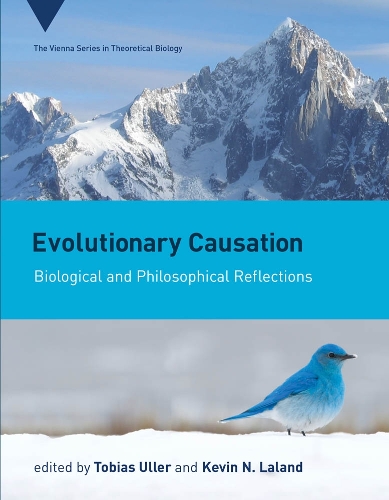
Evolutionary Causation: Biological and Philosophical Reflections
(Hardback)
Publishing Details
Evolutionary Causation: Biological and Philosophical Reflections
By (Author) Tobias Uller
Edited by Kevin N. Laland
Contributions by Tobias Uller
Contributions by Kevin N. Laland
Contributions by Massimo Pigliucci
Contributions by Arlin Stoltzfus
Contributions by Armin P. Moczek
Contributions by David I. Dayan
Contributions by Melissa A. Graham
Contributions by John A. Baker
MIT Press Ltd
MIT Press
3rd September 2019
United States
Classifications
Professional and Scholarly
Non Fiction
Popular philosophy
576.8
Physical Properties
Hardback
360
Width 178mm, Height 229mm, Spine 27mm
Description
A comprehensive treatment of the concept of causation in evolutionary biology that makes clear its central role in both historical and contemporary debates.Most scientific explanations are causal. This is certainly the case in evolutionary biology, which seeks to explain the diversity of life and the adaptive fit between organisms and their surroundings. The nature of causation in evolutionary biology, however, is contentious. How causation is understood shapes the structure of evolutionary theory, and historical and contemporary debates in evolutionary biology have revolved around the nature of causation. Despite its centrality, and differing views on the subject, the major conceptual issues regarding the nature of causation in evolutionary biology are rarely addressed. This volume fills the gap, bringing together biologists and philosophers to offer a comprehensive, interdisciplinary treatment of evolutionary causation. Contributors first address biological motivations for rethinking evolutionary causation, considering the ways in which development, extra-genetic inheritance, and niche construction challenge notions of cause and process in evolution, and describing how alternative representations of evolutionary causation can shed light on a range of evolutionary problems. Contributors then analyze evolutionary causation from a philosophical perspective, considering such topics as causal entanglement, the commingling of organism and environment, and the relationship between causation and information. Contributors John A. Baker, Lynn Chiu, David I. Dayan, Renee A. Duckworth, Marcus W Feldman, Susan A. Foster, Melissa A. Graham, Heikki Helanter , Kevin N. Laland, Armin P. Moczek, John Odling-Smee, Jun Otsuka, Massimo Pigliucci, Arnaud Pocheville, Arlin Stoltzfus, Karola Stotz, Sonia E. Sultan, Christoph Thies, Tobias Uller, Denis M. Walsh, Richard A. Watson
Reviews
In summary, Uller and Laland have done an excellent job in compiling this edited volume that should be of interest to all those who wish to dwell on the high-level conceptual debates in evolutionary biology over the last decades. The main value of this volume, to me, is that it forced me to think and clarify my own views, particularly when reading chapters in which I disagreed with the contributors. This volume is also valuable because it exposes conceptual disagreements within the reformist camp. One would wish to see a similar volume published where the disagreements within the more traditionalist camp in evolutionary biology were exposed in a similar fashion. Evolutionary biology today is certainly a mature scientific field with room for several different research traditions and in which different schools of thought coexist. This book, alongside more traditionalist perspectives, could be excellent material for a cross-departmental reading group of evolutionary biologists and philosophers, who certainly have much to learn from each other.
BioScienceAuthor Bio
Tobias Uller is Professor of Evolutionary Biology at Lund University, Sweden. Kevin N. Laland is Professor of Behavioural and Evolutionary Biology at the University of St. Andrews. Tobias Uller is Professor of Evolutionary Biology at Lund University, Sweden. Kevin N. Laland is Professor of Behavioural and Evolutionary Biology at the University of St. Andrews. Massimo Pigliucci is Professor of Philosophy at the City University of New York. Kevin N. Laland is Professor of Behavioural and Evolutionary Biology at the University of St. Andrews. Tobias Uller is Professor of Evolutionary Biology at Lund University, Sweden. Richard A. Watson is a Senior Lecturer in the BIO@ECS Research Group, School of Electronics and Computer Science, University of Southampton.
